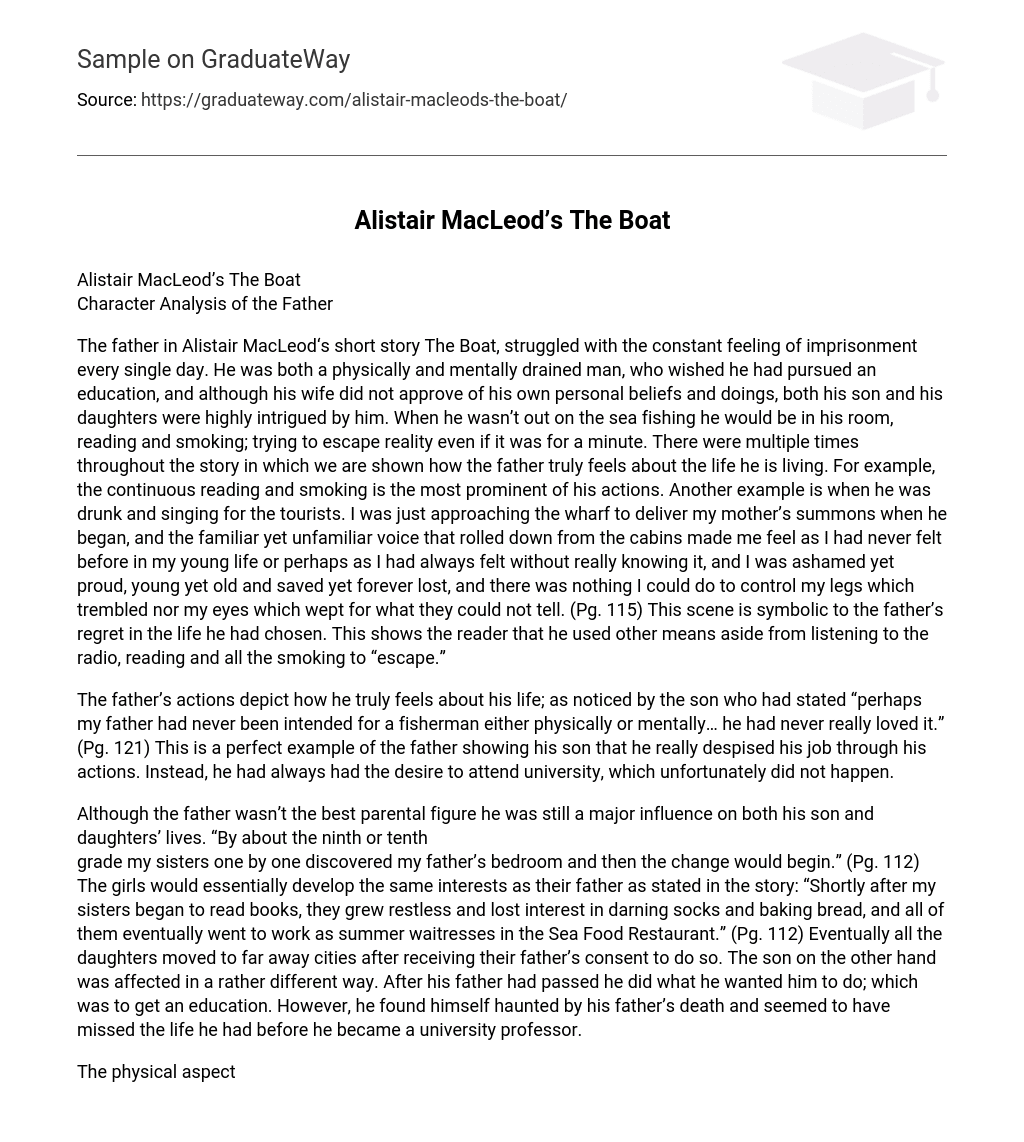The father in Alistair MacLeod‘s short story The Boat, struggled with the constant feeling of imprisonment every single day. He was both a physically and mentally drained man, who wished he had pursued an education, and although his wife did not approve of his own personal beliefs and doings, both his son and his daughters were highly intrigued by him. When he wasn’t out on the sea fishing he would be in his room, reading and smoking; trying to escape reality even if it was for a minute. There were multiple times throughout the story in which we are shown how the father truly feels about the life he is living.
For example, the continuous reading and smoking is the most prominent of his actions. Another example is when he was drunk and singing for the tourists. I was just approaching the wharf to deliver my mother’s summons when he began, and the familiar yet unfamiliar voice that rolled down from the cabins made me feel as I had never felt before in my young life or perhaps as I had always felt without really knowing it, and I was ashamed yet proud, young yet old and saved yet forever lost, and there was nothing I could do to control my legs which trembled nor my eyes which wept for what they could not tell. (Pg. 115) This scene is symbolic to the father’s regret in the life he had chosen. This shows the reader that he used other means aside from listening to the radio, reading and all the smoking to “escape.”
The father’s actions depict how he truly feels about his life; as noticed by the son who had stated “perhaps my father had never been intended for a fisherman either physically or mentally… he had never really loved it.” (Pg. 121) This is a perfect example of the father showing his son that he really despised his job through his actions. Instead, he had always had the desire to attend university, which unfortunately did not happen.
Although the father wasn’t the best parental figure he was still a major influence on both his son and daughters’ lives. “By about the ninth or tenth grade my sisters one by one discovered my father’s bedroom and then the change would begin.” (Pg. 112) The girls would essentially develop the same interests as their father as stated in the story: “Shortly after my sisters began to read books, they grew restless and lost interest in darning socks and baking bread, and all of them eventually went to work as summer waitresses in the Sea Food Restaurant.” (Pg. 112)
Eventually all the daughters moved to far away cities after receiving their father’s consent to do so. The son on the other hand was affected in a rather different way. After his father had passed he did what he wanted him to do; which was to get an education. However, he found himself haunted by his father’s death and seemed to have missed the life he had before he became a university professor.
The physical aspect of the story tells us a lot about the father’s character as well. He burned and reburned over and over again and his lips still cracked so that they bled when he smiled, and his arms, especially the left, still broke out into the oozing salt-water boils as they had ever since as a child I had first watched him soaking and bathing them in a variety of ineffectual solutions. The chafe-preventing bracelets of brass-linked chain that all the men wore about their wrists in early spring were his the full season and he shaved but painfully and only once a week. (Pg. 121)
This shows the reader the profound effects physical life can have on oneself. The sea (and the fishing) not only affected the father mentally, but affected him physically as well. The description of the father’s tattered and lifeless body is another example of how the sea affected him as well: His hands were shredded ribbons as were his feet, which had lost their boots to the suction of the sea, and his shoulders came apart in our hands when we tried to move him from the rocks. And the fish had eaten his testicles and the gulls had pecked out his eyes and the white-green stubble of his whiskers had continued to grow in death, like the grass on graves, upon the purple, bloated mass that was his face. There was not much left of my father, physically, as he lay there with the brass chains on his wrists and the seaweed in his hair. (Pg. 125)
There is a touch of parody added by the seaweed at which is aimed toward the father who was chained, beaten, and consumed by the sea. Death was obviously his final attempt at “escaping”, however, he was still taken by what he was trying so hard to get away from in the first place. Making reference back to the quote “as he lay there with brass chains on his wrists…” (Pg. 125) it seems as though mentally he was free, but physically he was still bound to the sea forever.
Was the father truly free at the end of the story? He had certain “methods” in which he used to escape into the person he truly was; however, in life he was never completely free in my opinion. The only thing that would truly set him free is that his own children would not have had that same obligation as he had to his father. It was interesting that he gave his daughters the passion for reading and pursuing a life very different from “a small fishing village” and in death (accidental or suicidal) gave his own son the freedom to choose his own destiny possibly breaking this cycle of obligation. This would give the father peace at the end of his life.





